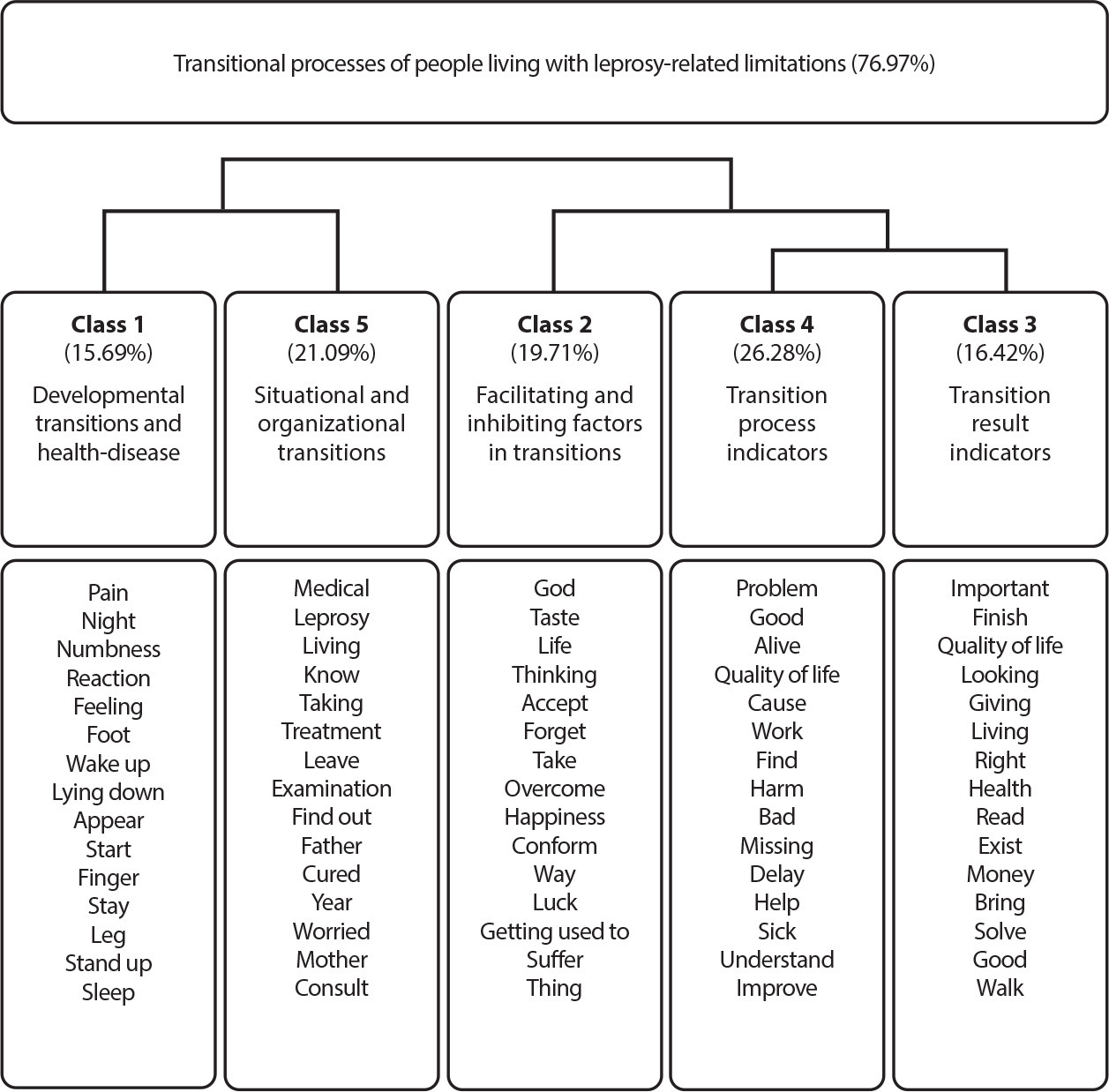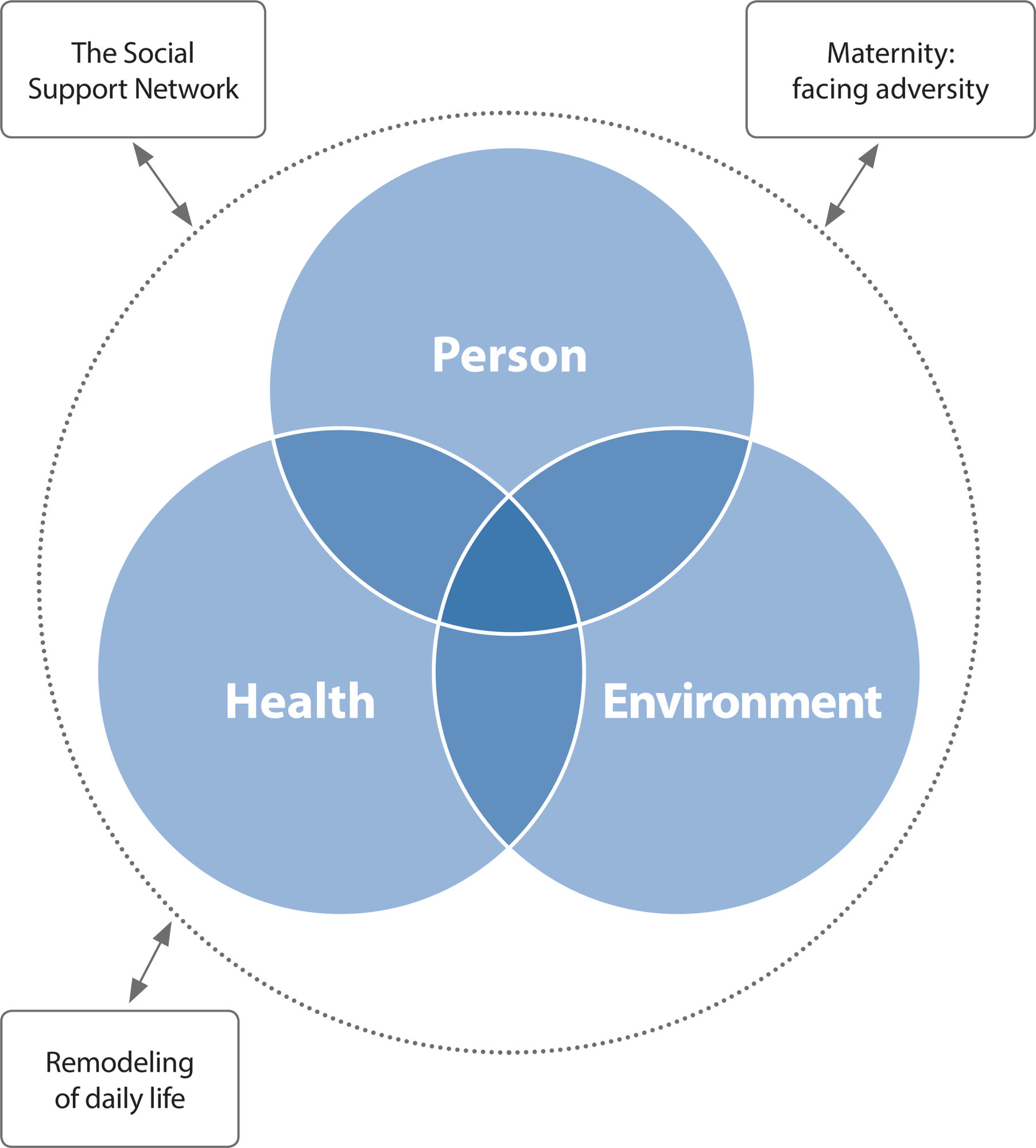-
ORIGINAL ARTICLE
Transitions experienced by people living with limitations resulting from leprosy: a research-care study
Revista Brasileira de Enfermagem. 2024;77(5):e20230229
11-22-2024
Resumo
ORIGINAL ARTICLETransitions experienced by people living with limitations resulting from leprosy: a research-care study
Revista Brasileira de Enfermagem. 2024;77(5):e20230229
11-22-2024DOI 10.1590/0034-7167-2023-0229
Visualizações0Ver maisABSTRACT
Objective:
to understand the transitional processes that affect the adaptation of people who live with limitations resulting from leprosy.
Methods:
This is a qualitative study based on the precepts of Transition Theory, mediated by care-research, with 24 people with limitations resulting from leprosy in an ex-hospital colony in Piauí. Semi-structured interviews were carried out. The interviews were analyzed using Iramuteq software.
Results:
the researched-caregivers experienced the four types of transitions, including feelings of fear, worry, loneliness, hopelessness, guilt and a tendency to hide the diagnosis. Breakdowns and resignation were revealed, with spirituality, adaptation to the new life situation and acceptance as facilitating conditions for coping with the transitional process, with a consequent improvement in quality of life.
Final considerations:
the transitional processes had a positive significance, since they contributed to adaptation and the achievement of quality of life.

-
ORIGINAL ARTICLE
Nursing in Primary Health Care: association between leadership, psychological capital, and burnout implications
Revista Brasileira de Enfermagem. 2022;75(suppl 3):e20210942
07-18-2022
Resumo
ORIGINAL ARTICLENursing in Primary Health Care: association between leadership, psychological capital, and burnout implications
Revista Brasileira de Enfermagem. 2022;75(suppl 3):e20210942
07-18-2022DOI 10.1590/0034-7167-2021-0942
Visualizações0Ver maisABSTRACT
Objectives:
to verify the association between authentic leadership and burnout syndrome in Primary Health Care nursing professionals and analyze the relationship between positive psychological capital and burnout syndrome in subordinate nursing professionals.
Methods:
a field, descriptive-exploratory, cross-sectional study with a quantitative approach, developed with the nursing team, in Basic Health Units in the city of São Paulo, with the application of the sociodemographic questionnaires, Burnout Characterization Scale [Escala de Caracterização do Burnout], Authentic Leadership Questionnaire and Psychological Capital Questionnaire.
Results:
in leaders’ perception, there was no evidence of significant associations between burnout and authentic leadership scales. There was a significant negative association of the burnout scale dimensions with the leadership dimensions regarding the subordinates. There was evidence of significant negative associations in the burnout scores with the scores of the psychological questionnaire dimensions.
Conclusions:
in nursing, burnout is associated with authentic leadership and psychological capital.
-
ORIGINAL ARTICLE
Care demands experienced by family caregivers of children with Primary Immunodeficiency
Revista Brasileira de Enfermagem. 2020;73(suppl 4):e20180795
09-21-2020
Resumo
ORIGINAL ARTICLECare demands experienced by family caregivers of children with Primary Immunodeficiency
Revista Brasileira de Enfermagem. 2020;73(suppl 4):e20180795
09-21-2020DOI 10.1590/0034-7167-2018-0795
Visualizações0Ver maisABSTRACT
Objective:
to understand the experiences of family caregivers of children with Primary Immunodeficiency in view of care demands.
Methods:
a qualitative research. Data collection was subsidized by an open interview with five family caregivers, and the data were analyzed using the Bardin Content Analysis technique, thematic modality. The Callista Roy’s Adaptation Model of Nursing was used to interpret the data.
Results:
from participants’ reports, the following categories emerged: Maternity: facing adversity; Remodeling of daily life; The Social Support Network resource.
Final considerations:
family caregivers experience several feelings such as anguish and low self-esteem due to the fear of losing their child and the routine of illnesses and hospitalizations, in addition to needs that are often not reached due to incompatibility with the family budget. The Social Support Network is strengthened for most caregivers, playing an essential role as a coping strategy for caregivers.




